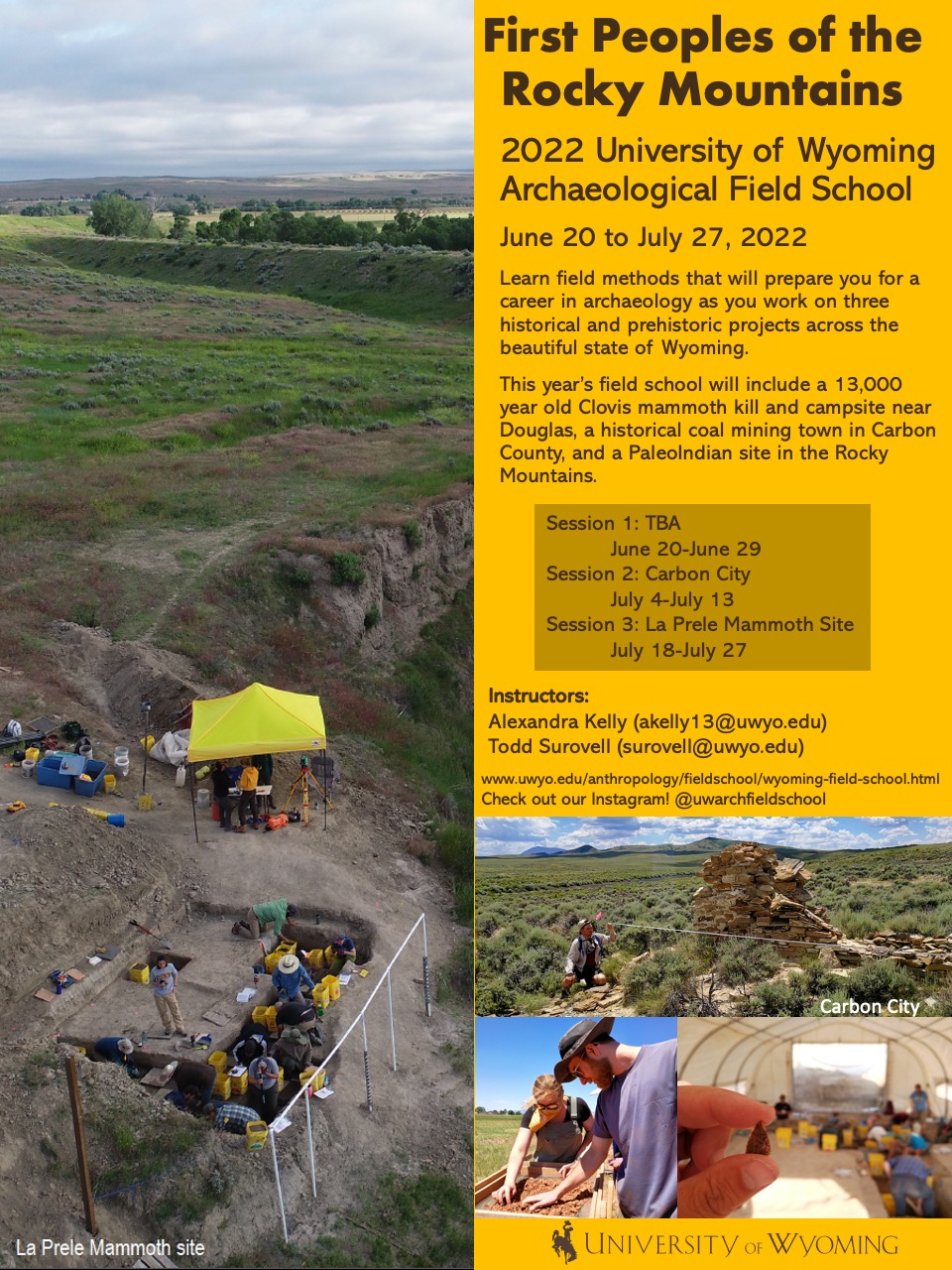Fieldwork
This listing expired on May 1, 2022. Please contact akelly13@uwyo.edu for any updated information.

Location: Wyoming, USA
Season: June 20, 2022 to July 27, 2022
Session Dates: June 20-June 29, July 4-13, July 18-27
Deadline Type: Rolling
Discount for AIA members: https://www.uwyo.edu/anthropology/fieldschool/wyoming-field-school.html
Program Type:
Field School
RPA Certified:
No
Affiliation:
University of Wyoming
Project Director:
Alexandra Kelly, Todd Surovell
Project Description:
The University of Wyoming Archaeological Field school provides professional-level training in field research methods at three Rocky Mountain locations. Learn to recognize and identify chipped stone tools and debris, ceramic sherds, historical artifacts, faunal remains, fire-cracked rock, stone circles and fire hearths; collect sediment, radiocarbon, and flotation samples; read stratigraphic profiles; excavate; record data; read maps; use a GPS; conduct surface survey; fill out site forms — all the basics of archaeological fieldwork. You will learn how to use field technology, such as total stations. The first session’s location is still being finalized but we hope will be a PaleoIndian site in the Rocky Mountain region. There, students will learn survey, mapping, augering, and test excavation methods. The second session will be at Carbon City, the location of Wyoming’s first coal mining town along the former route of Union Pacific Railroad (in Carbon County). The town was founded in 1868 and abandoned in the early 20th century. We will be continuing fieldwork started in 2021, which will involve mapping and excavation. This year’s third session continues 2014-21 fieldwork at the La Prele Mammoth site in Converse County, Wyoming where students will learn careful excavation methods, screening, and mapping with a total station. The field school includes a range of experiences – and at beautiful Wyoming locations.
All students will live in a field camp and must provide their own basic camping gear (tent, sleeping bag, etc.; the field school provides all kitchen and excavation gear). All students will assist in regular camp chores (cooking, cleaning up, etc.). The work is physically demanding and takes place regardless of Wyoming’s fickle weather (which can include rain, snow and/or freezing temperatures even in summer). Students should be in good physical shape, ready to hike steep mountains under arid conditions at elevations over 5280 feet and prepared to eat and live in remote locations away from town, Internet access and cell phone connections.
We teach the field school in three 10-day sessions, separated by two, four-day intervals. Students are responsible for themselves during those four days. A 6-credit, 30-day field school is the minimal accepted standard to qualify for entry-level employment on research or Cultural Resource Management projects. Credit from the University of Wyoming field school should be transferable to any academic institution and fulfill the field school requirement of any CRM company.
We can accept about 12 students for the field school, and welcome applications from students at any educational level or from any background. We do, however, give preference to those students majoring in anthropology, who seek a career in archaeology and who have taken at least one archaeology course. The field school is a good place to discover if a career in archaeology is the right place for you.
The Anthropology Department offers multiple archaeological field schools to students with different levels of archaeological expertise so please explore our other offerings as well.
Period(s) of Occupation: Field School Session 1 (June 20- 29) - Survey and Testing at TBA Paleoindian Site Information will be updated when we have finalized the site. Field School Session 2 (July 4 - July 13) Mapping and Testing at Carbon City Off the beaten track in the sagebrush steppe between Laramie and Rawlins is the former site of the town of Carbon, Wyoming. The town was founded in 1868 along the route of the transcontinental railroad where coal from its mines was used to fuel steam engines. We have yet to fully flesh out our plans for this project, but we will most likely spend most of our timing mapping, surveying, and completing test excavations in what is today a battered ghost town in the high desert. Field School Session 3 (July 18- July 27) – Excavations at the La Prele Mammoth site During the third session, students will have the rare opportunity to work on one of Wyoming's oldest archaeological sites. The La Prele Mammoth site is nearly 13,000 years. It is a place where humans killed a subadult Columbian mammoth and set up camp to butcher it. Here students will learn careful excavation methods, water screening, and mapping with a total station. Course Instructors: Dr. Alexandra Kelly, UW Faculty Archaeologist Dr. Kelly is a historical archaeologist who has engaged in archaeological research (excavation, survey and artifact analysis) in Kenya and Tanzania as well as in the American Southwest. She has worked extensively with object assemblages in East Africa, England and the U.S., with a focus on material culture studies, colonialism, exchange and critical heritage studies. Dr. Todd Surovell, UW Faculty Archaeologist Dr. Surovell has more than 25 years of experience in archaeology, excavating in western North America, Europe, and Asia. He is an expert in Paleoindian archaeology, geoarchaeology, and lithic technology.
Project Size: 1-24 participants
Minimum Length of Stay for Volunteers: 6 weeks
Minimum Age: NA
Experience Required: No experience necessary, we prioritize applicants with some anthropology coursework.
Room and Board Arrangements:
Covered within the field school costs (mostly camping), students are required to make their own plans between sessions.
Academic Credit:
6 credit hours
The AIA is North America's largest and oldest nonprofit organization dedicated to archaeology. The Institute advances awareness, education, fieldwork, preservation, publication, and research of archaeological sites and cultural heritage throughout the world. Your contribution makes a difference.
Notifications